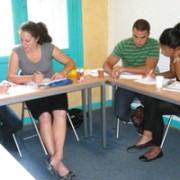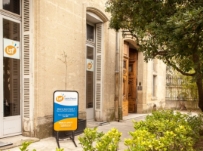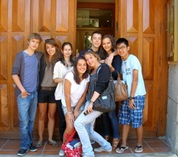Our top tips for encouraging language learning at home
It’s well known that learning something when you’re young is the secret to learning it well, and for life. No more so is this relevant than in learning a foreign language, which – as any adult learner will testify – is more difficult later in life.
A child, on the other hand, their brain growing and eager to absorb new things, will soak up new language quickly. Expose them to a second language at an early age (before 10 is good; before 5 is great) and they show an innate ability to learn new words and develop natural pronunciation, without the inhibition that hinders us later in life.
Whether you have a toddler or a teen, there is plenty you can do, and you don’t even have to be good at languages yourself – take this as an opportunity to learn a language alongside your child!
Here are our top 10 ways to help your kids learn a language:
1. Nursery rhymes and songs
Younger children react positively to the repetition and melody of nursery rhymes and songs. Even if they don’t understand the words at first, this is a fun and effective way to absorb a foreign language. Go beyond Frère Jacques by buying a CD of French songs such as French Playground or 60 Comptines pour Crèche; alternatively, the BBC website offers fun, basic songs for primary school-aged children. Grab a few instruments and have a morning of music and fun!
2. Story tapes
Search for your child’s favourite story in another language. Bob the Builder becomes Bob le Bricoleur, Little Red Riding Hood becomes Le Petit Chaperon Rouge, and Snow White and the Seven Dwarfs becomes Blancanieve y los 7 enanitos. Even Sesame Street and Dora the Explorer have been translated. Read the foreign language version along with your child, or play the CD that narrates the story for you both.
3. Word & picture cards
A basic idea, but a great way to learn and remember vocabulary, as it’s much easier to remember a word when associated with a colourful image. Simply write the name of an object, in the target language, next to a picture of that object. Then stick these cards around the house, for constant exposure, or bring them out as a game to name objects in the house and garden.
4. Indulge in the local culture!
 If it takes a chocolat chaud and a croissant, then so be it. Pretend that you are living in France for the day and surround yourselves at home with French-related goodies. Play some French music or French radio in the background, draw a French flag, make a necklace with red, white and blue beads, serve baguette and French cheeses for lunch, play boules in the garden, and end the day with a trip to the local crêperie. It’s the next best thing to being in France.
If it takes a chocolat chaud and a croissant, then so be it. Pretend that you are living in France for the day and surround yourselves at home with French-related goodies. Play some French music or French radio in the background, draw a French flag, make a necklace with red, white and blue beads, serve baguette and French cheeses for lunch, play boules in the garden, and end the day with a trip to the local crêperie. It’s the next best thing to being in France.
5. Find a pen pal
 Once you child is a bit older and knows the basics in a foreign language, a pen pal is a great way to practise the language and exert some independence. There’s nothing like the excitement of an air mail letter dropping on the doormat (who receives hand-written letters these days?), or an email into the Inbox, to encourage a flurry of letter-writing back. Having a pen pal abroad is also a great way to learn about culture in another country and appreciate the differences in lifestyle, eg. school, food, holidays, hobbies, etc. – proving how language exposure can help your child to increase perspective.
Once you child is a bit older and knows the basics in a foreign language, a pen pal is a great way to practise the language and exert some independence. There’s nothing like the excitement of an air mail letter dropping on the doormat (who receives hand-written letters these days?), or an email into the Inbox, to encourage a flurry of letter-writing back. Having a pen pal abroad is also a great way to learn about culture in another country and appreciate the differences in lifestyle, eg. school, food, holidays, hobbies, etc. – proving how language exposure can help your child to increase perspective.
6. Interactive learning
Like it or not, your child is growing up in a technically advanced world. Put aside Minecraft and use the tablet to hook up to some excellent interactive and educational programmes online. For younger children, the BBC’s Muzzy series is a fun language course led by a cuddly, green character and comprising DVDs, audio, songs and written work. Older children familiar with Wii and Nintendo will like their My French Coach (and My Spanish Coach) language software. An easy compromise if they like computer games, these games are fun and interactive whilst providing the basics of grammar, vocabulary and pronunciation.
7. Podcasts
Older children will love the technology and independence of downloading their own free language podcasts from iTunes. Le Journal en Français Facile is a daily and easily-understood podcast delivering the nightly news from Radio France Internationale, and likewise Langsam gesprochene Nachrichten does so in German. Follow with the transcript to catch those words you’re not sure of.
8. Talk about them in another language
A cunning ploy if you and your partner both speak another language. A colleague at work revealed that the most successful way to get his girls to learn French was to chat to his wife, about them, in French. Frustrated at not understanding the conversation, the girls had immediate impetus to up their game and catch their parents out. Sure enough, as dad told mum one night that he thought “Elle est fatiguée”, the oldest daughter responded quite indignantly, “Je ne suis PAS fatiguée!”.
9. Speak the language yourself
Practise what you preach! If your kids hear you speaking a language at home they will be more likely to speak it themselves. Drop in key words around the house, such as when you want them to pass you something, at meal times or bathtime. Even if at first they don’t understand, repetition will help their little brains to absorb the language and one day say it back to you.
10. Go abroad
 Money permitting, a trip to the country of the language your child is learning can really boost motivation and progress. In the exciting run-up to your holiday you can all practise the language together, and once there your child will absorb all the sights and sounds, be able to practise the basics, and get a real feel for another culture. Being able to travel and speak to people of other nationalities and cultures is, after all, what learning a language is all about.
Money permitting, a trip to the country of the language your child is learning can really boost motivation and progress. In the exciting run-up to your holiday you can all practise the language together, and once there your child will absorb all the sights and sounds, be able to practise the basics, and get a real feel for another culture. Being able to travel and speak to people of other nationalities and cultures is, after all, what learning a language is all about.
Cactus runs after-school language courses for juniors aged 7-15 years in London and in Brighton. Courses start in September 2015 and run for 10 weeks. Available in French, Spanish or Mandarin Chinese, the emphasis is on learning through games, songs and other fun age-appropriate activities to make language learning educational and enjoyable.
Parents wishing to send their children abroad to learn a language can book one of our popular summer language camps for 5-18 year olds.
 Montpellier: French AS / A Level Revision Course (26 lessons per week) = from £291
Montpellier: French AS / A Level Revision Course (26 lessons per week) = from £291





 Yes, I would recommend the course as it offers a young adult both a personal and socio-linguistic learning curve within a regulated environment. Caspar was not the youngest student last year: there were 12 year olds at Montepellier, some more confident than others. It’s all a question of maturity. Any 12 year old will be amongst 14 / 15 year olds and there is, as you know, a huge difference in slight age differences during the teenage years. To be honest, I was more nervous of letting him go last year, than he was of going – both vigilance and homesickness were issues. The same is true this year; he is only just 14. There are always risks. But, these, we felt, were minimised last year as we always had the assurance that a family friend lived in Beziers (a short drive away). I also had some email correspondence with Mme Meson prior to his visit and she seems a good sort (which through experience, was proved and she was a delight to meet).
Yes, I would recommend the course as it offers a young adult both a personal and socio-linguistic learning curve within a regulated environment. Caspar was not the youngest student last year: there were 12 year olds at Montepellier, some more confident than others. It’s all a question of maturity. Any 12 year old will be amongst 14 / 15 year olds and there is, as you know, a huge difference in slight age differences during the teenage years. To be honest, I was more nervous of letting him go last year, than he was of going – both vigilance and homesickness were issues. The same is true this year; he is only just 14. There are always risks. But, these, we felt, were minimised last year as we always had the assurance that a family friend lived in Beziers (a short drive away). I also had some email correspondence with Mme Meson prior to his visit and she seems a good sort (which through experience, was proved and she was a delight to meet).























